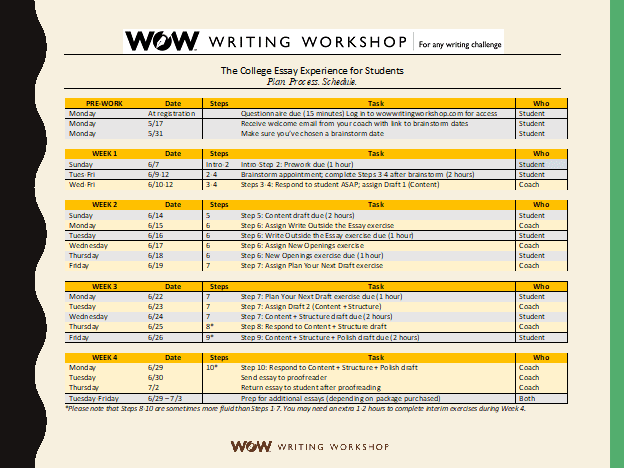Year after year, the world keeps changing. But, through all of it, one thing remains the same: the college application essay. To apply to college, a student will likely need to write at least 1 essay, and quite possibly 10 or more.
Wow has teamed up with Applerouth Tutoring many times in the past several years, offering free webinars and blogs for families and professionals who work with families. Here are some highlights from one of our joint webinars, “College Essay 101,” featuring Wow’s President Kim Lifton and Applerouth Director Ginger Fay.
In this one-hour webinar for College Week, Ginger Fay, a former Director at Applerouth, and Kim Lifton, President and Co-founder of Wow Writing Workshop, peeked into the first four steps of the Wow process and shared Wow’s best college essay writing tips. We’ve summarized some of the main points of the webinar in this blog. You’ll want to consider watching the whole thing to gain even more insights into Wow’s signature college essay-writing process.


Kim Discusses Wow’s “Secret” College Essay Writing Tips
A lot of times parents expect to find some magic formula that’s going to help their child write the perfect college essay, something outstanding that no one’s ever seen before and will guarantee admission into college. The hard truth is that there is secret formula, despite what you hear or read online, or in books.
Colleges want a genuine story about the student that answers a prompt, shows insight and shares something meaningful that the college wouldn’t otherwise know from reading the rest of the application.
Every effective essay (note that we don’t use the word “good!”) answers these two questions:
- What happened?
- Why does it matter?
Answering the question, “Why?” is most important. Our secret is the way we help students do this, specifically the process we use to get them there. It’s not flashy; the process starts with making a schedule. To succeed on a college application essay, your child is going to need a process, a plan they can implement and a schedule you can also follow to help them stay on track.
The real, real secret is in creating this schedule. This doesn’t mean saying “I’m going to write this essay,” or telling your child “Honey, go write your essay this weekend.” Instead, we give baby steps, bite-sized chunks of instructions over a four-week period. A sample schedule looks like this:

Sample schedule
You can see how much time is spent on each step. Our students spend about two and a half weeks actually going through the writing process: idea-generation, brainstorming, and revision. This process takes about 14-20 hours overall for the very first essay. This means no cramming, or writing for eight hours straight. It’s broken up over two and a half weeks to make the process doable for any student.
All your child needs to succeed on a college essay is instructions. No matter what you think about the high school your child goes to or their writing teacher or their English teacher, they are ready for this because the college essay is a thinking task even more than it is a writing task. Our schedule helps facilitate that thinking, which is why we’ve been so effective for over a decade.
The Parent Role in the College Essay Process
Ginger and Kim agree that the best way for you to help your child is to teach them to reflect on themselves. This can be a continuous conversation. You can help your child understand what makes them tick because you know them so well. The problem is you don’t know what they’re thinking about, but you do know if they’re resourceful, or if they’re kind, or if they’re compassionate. The key is not telling them which trait to focus on in the college essay or essays but to help guide them, help them understand that they all have these remarkable traits and that colleges want to know that trait that your child likes about themselves the best.
However, it’s important to avoid helping your children come up with ideas. That’s when you can overstep. You may mean well, but colleges don’t care about what you think. They only want to know how your child thinks. So don’t ever tell your child what to write. Tell them what traits you like about them, ask them to ask their friends what they like, have them think about it. Be a cheerleader, but not a coach.
GInger suggested that if you’re worried that you or someone else may have overstepped when working with your child on their college application essay, try encouraging your child to read the essay out loud. Usually, phrases that aren’t theirs will stick out like a sore thumb. They don’t need any audience: The wall, the dog, or the mirror will do just fine. If they read it out loud, they should be able to catch any of those places where someone who was well-intentioned tried to help a little too much and gave them an example that doesn’t really resonate with them or a word that came out of the thesaurus instead of their own head. And anyway, reading out loud is a great late-stage revision technique.
Kim added that there are a few other ways you can help your child during this process as well. Help them parse the prompt before they start writing, for example. Discuss what each means and what colleges want. You can brainstorm ideas with your child, and you can provide a brief overview of the essay’s significance within the admissions process. And, through all of this, make sure to stay positive and offer your child encouragement.
The Best and Worst Essay Topics
What are the best and worst college essay topics? At Wow, we get this question at least 10 times a week. There’s no magic bullet. The best topic is the one that illustrates a trait that your child wants to share with colleges and is insightful. The worst one doesn’t do that. It may sound simple, but there are no universal best topics and no worst topics.
The question about topics is related to another question we get all the time: What do admissions counselors look for? According to Ginger, colleges are “not looking for anything other than for you to share the story you have to tell as a student. If there were right and wrong answers, if there was a perfect checklist of things that they were looking for, then everyone on the campus would be the same.”
Kim said Wow coaches have read great essays that have been about very ordinary things and ineffective essays about extraordinary moments. As Ginger puts it, the subject of the essay is unimportant compared to the way that the subject is expressed. This doesn’t mean that you need to be an amazing writer to write an effective essay. Any high school student is able to write one with the right help. But, as Ginger says, “The essay is important because it’s the one time that you actually get to speak directly to the admissions committee.” If you tell a story that answers the prompt and highlights a positive trait about yourself, you’ll have made the most out of this opportunity.
The College Essay’s Significance
The essay has always been important and will continue to be important in the application process. It’s not going to rescue someone’s application who’s not qualified to attend a certain school, but it can help a student make their case.
Some people are saying that, for any number of reasons, the essay is more important now than in the past. Really, though, it doesn’t matter because your child has to write their essays regardless.
Covid Prompts Added to Common App in 2020
In 2020, we thought it was pretty important for as many students as possible to answer the Common App’s optional COVID-19 prompt because it was new. By giving it as an option, colleges were saying that this was something that was important to them.
However, this far into the pandemic (spring 2022), neither Wow nor Applerouth give that blanket recommendation. If something really significant happened that your child wants to share, they should share it by all means assuming that it doesn’t come up elsewhere in the application. At the same time, colleges do not want your child to feel pressure to manufacture any kind of experience or to demonstrate how resourceful they were during the pandemic. They’re really not interested in that. They’re interested in hearing exactly what the prompt asks about: If COVID-19 has had an impact on your child.
Best College Essay Writing Tips for Choosing a Prompt
There are almost thousands and thousands of colleges and universities in the United States and abroad, most with their own essay prompts. Organizations like the Common App and the Coalition Application significantly cut down the number of prompts a student will have to address, but the problem of choosing and answering a prompt can still be overwhelming.
When we talk about “the college essay,” most of the time we’re referring to the Common App personal statement, an essay that a large majority of applicants will write. There are seven prompts, the last of which gives applicants free-range to write on any topic of their choice. Even with this option, you still have to talk about something that happened and why it matters just like with the others. Most of our students opt for one of the other six because having a specific prompt can help narrow your focus in a useful way, but all seven are equally good options as long as a student can effectively answer them.

There’s a Common App prompt that asks:
Reflect on something that someone has done for you that has made you happy or thankful in a surprising way. How has this gratitude affected or motivated you?
If you want to write about being grateful, you certainly can. But, if you choose to answer this prompt, make sure you’re actually doing so. At first glance, it seems to be asking about how you felt the time you felt gratitude but it’s not so simple. It’s actually reflective and very specific, and includes some keywords that are important to pinpoint. Here, those words are “reflect,” “surprising,” “gratitude,” “affected,” and “motivated.” You’re being invited to reflect on someone else’s action, but the story you tell should not be primarily about the other person’s act.
In fact, nothing you write about for a college essay should be about somebody else. always about yourself. It should be about how your experience affected you, what changed for you, what did you do differently as a result. The prompt doesn’t ask you however just to share any act of kindness. Readers want to know about something someone did for you that made you happier or thankful in a surprising way. Maybe the other person surprised you, or maybe you were surprised that you felt so grateful or happy.
Make sure you can identify a story and that it’s very specific and focuses on you. To effectively address this prompt, you need to showcase a characteristic or trait that demonstrates who you are and fits these criteria, but also explains how your gratitude affected or motivated you to do something. It’s another option, and because it’s new doesn’t mean it’s better or worse than the other six. The prompt that speaks to you is the one you should pick.
More College Essay Writing Tips: Grammar, Formatting and Vocabulary
You may have heard that it’s essential to avoid indenting your paragraphs or to use two spaces after every period. Really, though, even if little things like this make it marginally easier to read an essay, admissions officers don’t care and won’t make or change a decision based on the formatting of their essay.
When writing, you have bigger things to worry about than indentation or Oxford commas. While it’s important to have a healthy respect for the rules of written English, make sure you just do the best you can. Read your essay over and make sure everything’s spelled correctly. Don’t start your sentences with lower case I’s. There are things that just make you look bad. But spend your time and energy on the content and structure of your essay, not the way its formatted.
Another rumor about college essay writing tips is that they recommend you use fancy vocabulary or to write in a formal tone of voice. Really, though, it’s important to use the voice that you already know in your 17-year-old style. This is no time to be experimenting with words that you are not comfortable with. We actually advise our students to not even look up a word or to use a thesaurus. You’re supposed to sound like yourself: A smart 17-year-old student applying to college. It’s a mistake when you use words that aren’t in your normal vocabulary. You lose your authentic voice. It starts to sound a little off, and admissions officers can tell when you’re trying to impress. If you use big words every day in your life and have an extensive vocabulary, then by all means that’s what should come out. But don’t think that your vocabulary will help or hurt your application. Admissions officers just want to know who you are right now in your authentic voice!


